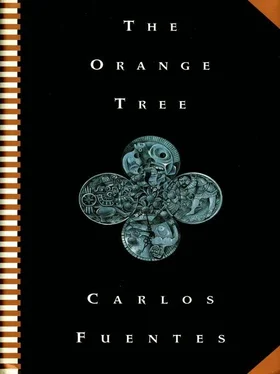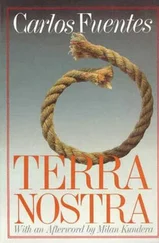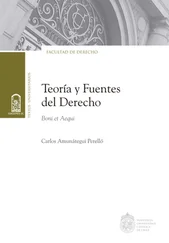But Cortés’s sex was ultimately less sexual than his mouth and beard, that beard which seemed too old for a thirty-five-year-old man, as if he’d inherited it from the times of Viriatus and his fields of hay set afire against the Roman invaders, from the times of the besieged city of Numantia and its squadrons dressed in mourning, from the times of Pelayo and his lances made from pure Asturian mist: a beard older than the man on whose jaws it grew. Perhaps the Mexicans were right, and a beardless Cortés wore, borrowed, the extremely long beard of that very same god Quetzalcoatl, with whom these natives confused him …
The most terrible, the most shocking thing was not Cortés’s sex, but that from the depth of the forest, from the mourning, from the mist, would emerge his tongue, which was the conqueror’s true sex, and that he would stick it into the Indian woman’s mouth with more power, more seed, and more pregnancy — my God, I’m delirious! I’m suffering, Lord! — with more fecundity than his sex. Tongue-phallus-whip, thrashing, hard, and ductile at the same time: poor me, Jerónimo de Aguilar, dead all this time, with my tongue split up the middle, fork-tongued like the plumed serpent. Who am I, of what use am I?
[4]
The Cholulans said we could enter without the Tlaxcaltecs. They could not renounce their gods, but they would obey the King of Spain with pleasure. They said it through La Malinche, who translated it from Mexican into Spanish while I stood there like a royal ninny, mulling over what my next step would be to recover my tattered dignity. (I’m not going far enough: language was more than dignity, it was power; and more than power, it was the very life that animated my plans, my own program of discovery, unique, surprising, unrepeatable …)
But since I couldn’t go to bed with Cortés, I thought I’d be better off giving the devil her due and decided that at least for now there was no sense crying over spilt milk.
During the first days, the Cholulans gave us abundant food and feed. But soon enough they began to stint on the food. Then they grew obstinate and remiss, and I started looking at Doña Marina with suspicion, while she stared back at me, immutable, firmly supported by her carnal intimacy with our captain.
A perpetual cloud ominously hung over the sacred city; the smoke became so thick we couldn’t see the tops of the temples or the stones under our feet. Cholula’s head and feet dissolved in mist, though it was impossible to know if it came, as I said when we arrived, from the different levels of the pyramid, from the horses’ assholes, or from the bowels of the mountains. The strange thing is that Cholula stands on level ground, but now nothing was level here and instead seemed unfathomable and craggy.
Observe how words transformed even the landscape: Cholula’s new landscape was nothing more than the reflection of the sinuous struggle of words, sometimes as deep as a ravine, at other times craggy, like a mountain of thorns; whispering and soothing like a great river, or stirred up and raucous like an ocean dragging loose stones: a shrieking of mermaids wounded by the tide.
I told the popes: “I lived in Yucatan for eight years. That’s where I have my true friends. If I abandoned them, it was to follow these white gods and find out their secrets, because they have not come to be your brothers but to conquer this land and smash your gods.
“Listen carefully to me,” I said to the priests. “These foreigners really are gods, but they are enemies of your gods.”
I said to Cortés: “There is no danger. They’re convinced we’re gods and honor us as gods.”
Cortés said: “Why then are they refusing us food and fodder?”
Marina told Cortés: “The city is full of sharpened stakes to kill your horses if you use them to attack; take care, sir; the roofs are piled high with stones, they’ve built protective screens of adobe bricks, and the streets are blocked with thick logs.”
I told the popes: “They are evil gods, but they are gods. They don’t have to eat.”
The popes replied: “How can it be they do not eat? What kind of gods can they be? The teúles eat. They demand sacrifices.”
I insisted: “They are different teúles. They don’t want sacrifices.”
I said it and bit my tongue because I saw in my argument a justification of the Christian religion I hadn’t noticed before. The popes exchanged looks, and a chill ran down my spine. They realized what I realized. The Aztec gods demanded the sacrifice of men. The Christian God, nailed to the cross, sacrificed himself. The popes stared at the crucifix raised at the entrance to the house taken over by the Spaniards and felt their minds collapse. In that moment, I would have been delighted to change places with the crucified Jesus, accepting His wounds if this nation did not make the invincible exchange between a religion that demanded human sacrifice and another that allowed divine sacrifice.
“There is no danger,” I said to Cortés, knowing there was danger.
“There is danger,” Marina said to Cortés, knowing there was none.
I wanted to destroy the conquistador so he would never reach the gates of the Great Tenochtitlán: I wanted Cholula to be his tomb, the end of his daring exploits.
Marina wanted to make an example of Cholula to preclude future betrayals. She had to invent the danger. As proof, she brought in an old woman and her son who swore that a great ambush was being prepared against the Spaniards and that the Indians had prepared their cooking pots with salt, chili, and tomatoes to boil us so they could stuff themselves with our flesh. Is it true, or did Doña Marina invent as much as I did?
“There is no danger,” I said to Cortés and Marina.
“There is danger,” Marina said to all of us.
That night, after a shotgun was fired, the Spanish massacre fell on the City of the Gods, and those who did not die pierced by our swords or blasted to pieces by our harquebuses were burned alive. When the Tlaxcaltecs entered, they poured through the city like a savage pestilence, stealing and raping without our being able to stop them.
In Cholula, not one idol was left standing, not one altar unscathed. The 365 Indian temples were whitewashed to banish the demons and dedicated to 365 saints, virgins, and martyrs from our book of saints’ lives, passing forever into the service of God Our Lord.
Cholula’s punishment was soon known in all the provinces of Mexico. In doubt, the Spaniards opted for force.
My defeat, less known, I declare here today.
Because I understood then that, in doubt, Cortés would believe La Malinche, his woman, and not me, a fellow Spaniard.
[3]
It wasn’t always that way. On the coasts of Tabasco, I was his only interpreter. I remember with joy our landing at Champotón, when Cortés depended totally on me, and our rafts plied the river opposite the Indian squadrons lined up on the shores. Cortés proclaimed in Spanish that we had come in peace, as brothers, while I translated into Maya, but also in the language of shadows:
“He’s lying! He’s come to conquer us, defend yourselves, don’t believe him.”
What impunity I had, how I delight in remembering it from the bed of an eternity even more ominous than my betrayal!
“We are brothers!”
“We are enemies!”
“We come in peace!”
“We come in war!”
No one, no one in the thick forest of Tabasco, its river, its jungle, its roots sunk forever in the darkness where only the macaws seemed touched by the sun, Tabasco of the first day of creation, cradle of silence broken by the screech of the bird, Tabasco, echo of the initial dawn: no one there, I say, could know that by translating the conquistador I lied. And yet, I spoke the truth.
Читать дальше












